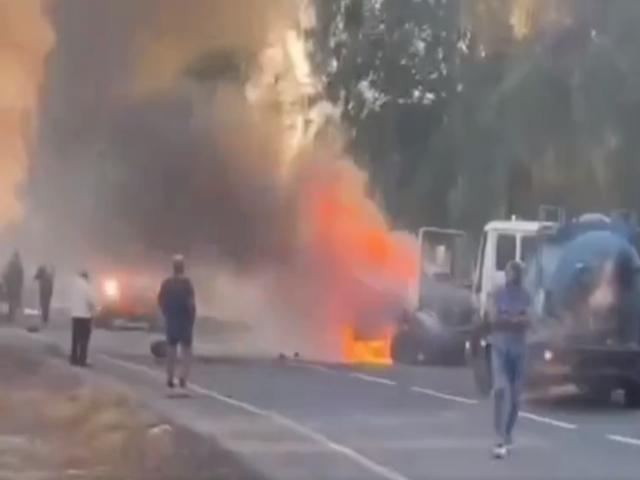In a dramatic escalation of hostilities, Lebanon’s Hezbollah launched a barrage of drones targeting an Israeli military base in northern Israel on Thursday. This audacious attack has left one person critically injured and intensified the already high-risk scenario of a full-scale conflict.
Hezbollah, a formidable militant group backed by Iran, has been engaged in near-daily skirmishes with Israel since October last year. The group announced that it had specifically targeted an artillery battalion in Kabri, located in the Western Galilee. This offensive, they claim, was a direct retaliation for Israel's continuous assaults on Lebanese towns and villages.
Growing Casualties and Rising Tensions
Hezbollah’s statement asserted that their strike inflicted multiple casualties. Israeli medics have confirmed that one individual suffered severe injuries. The local municipality head and medical personnel in Kabri corroborated the severity of the attack, highlighting the critical condition of the injured person. On Tuesday, two Israeli citizens were killed while driving in the Golan Heights. The husband and wife, both 46, leave behind three children.
Here in this spot, two Israeli citizens traveling in their car were murdered by a Hezbollah missile yesterday. This is the cruel reality for the citizens of Israel! pic.twitter.com/HWCDJpH5zb
— יוסף חדאד - Yoseph Haddad (@YosephHaddad) July 10, 2024
The Israeli military acknowledged the drone strike in Western Galilee, reporting that several unmanned aircraft were downed in the vicinity. Just hours after this incident, the Israeli Defense Forces (IDF) claimed to have intercepted and shot down additional suspected drones launched from Lebanon over the Upper Galilee before they could penetrate Israeli airspace.
Escalating Hostilities and Threats
The intensity of Hezbollah's attacks has surged in recent weeks, with the group launching hundreds of missiles and drones at Israel. This represents the most severe bout of violence since the last major conflict between the two entities in July 2006. In response, Israel has escalated its rhetoric, threatening to launch an all-out war with Lebanon to neutralize the Hezbollah threat.
Since the outbreak of hostilities on October 8, the Israeli military has conducted deep strikes within Lebanese territory, targeting Hezbollah installations over 100 kilometers (62 miles) from the Israeli border. These operations have included precision drone strikes and air raids, resulting in the elimination of several high-ranking Hezbollah commanders.
Massive barrage of Islamic republic funded rockets bombarding Israel now in the north.
— Emily Schrader - אמילי שריידר امیلی شریدر (@emilykschrader) July 11, 2024
Yesterday a couple was murdered in their car by Hezbollah — parents of 3 children. Devastating
pic.twitter.com/yVYTQBrTd6
Notable Hezbollah Casualties
In a significant blow to Hezbollah, senior commander Mohammad Neameh Nasser, known as Hajj Abu Neameh, was killed in an Israeli strike in the southern city of Tyre last week. Nasser was reportedly in charge of Hezbollah’s Aziz Unit, responsible for orchestrating rocket and anti-tank missile attacks on Israel from southwestern Lebanon.
Another high-profile casualty was Taleb Sami Abdullah, the highest-ranking Hezbollah official killed since the onset of the current hostilities. Abdullah, the leader of Hezbollah’s al-Nasr unit, perished alongside three other officials in an Israeli strike in the southern town of Jouya.
Earlier this year, Wissam Tawil, the commander of Hezbollah’s elite Radwan forces, was also killed in an Israeli strike in Majdal Selm, southern Lebanon.
Heavy Toll on Both Sides
The ongoing conflict has exacted a heavy toll on both sides. According to a Reuters tally, over 330 Hezbollah fighters and commanders have been killed by Israeli forces since October. Civilian casualties are also significant, with approximately 90 Lebanese civilians losing their lives.
On the Israeli side, the conflict has claimed the lives of 21 soldiers and 10 civilians. The violence has also extended beyond Lebanon, with Israel allegedly targeting Hezbollah operatives in Syria, where the group has been actively supporting President Bashar al-Assad’s regime since the Syrian civil war erupted in 2011.
Noa and Nir Barnes were murdered yesterday when a Hezbollah rocket hit their vehicle.
— Israel ישראל (@Israel) July 10, 2024
Their three children are now orphans 💔.
There are no words, but make no mistake.
Those who harm Israeli citizens will pay the price.
May their memory be a blessing. pic.twitter.com/IjvYDyQlKI
Regional Implications
In a recent incident on the Damascus-Beirut highway within Syrian territory, a suspected Israeli airstrike targeted a vehicle, killing Yasser Nimr Qarbash, a former bodyguard of Hezbollah leader Hassan Nasrallah. Qarbash was reportedly involved in the transportation of weapons for Hezbollah, underscoring the regional dimension of this conflict.
As the situation continues to deteriorate, the risk of a wider war looms large. Both Israel and Hezbollah remain on high alert, with each side poised to escalate further if provoked. The international community watches with bated breath, fearing that the volatile region might plunge into a full-blown conflict that could have far-reaching consequences.


